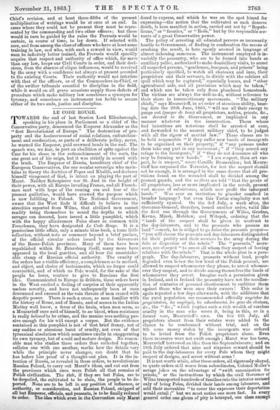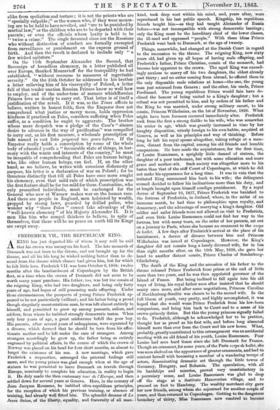LE CODE ROUGE.
TOWARDS the end of last Session Lord Ellenborough, speaking in his place in Parliament as a chief of the Conservative party, denounced the Emperor Alexander as the "first Revolutionist of Europe." The destruction of pro- perty and the bouleversement of social relations, enfranchise- ment and confiscation, as parts of a deliberate policy, never, he warned the Emperor, paid crowned heads in the end. The speech was, we fear, in part an ebullition of spite against the Czar for his share in the enfranchisement of the serfs, the one great act of his reign, but it was strictly in accord with the truth. The Emperor of Russia, hereditary chief of the European Conservatives, the one secular sovereign who main- tains in theory the doctrine of Popes and Khalifs, and declares himself vicegerent of God, is intent on playing the part of Marat. Neither Robespierre nor St. Just in the height of their power, with all Europe invading France, and all French- men mad with hope of the coming era and fear of the present guillotine, would have avowed the purpose which is now fulfilling in Poland. The National Government, aware that the West finds it difficult to believe in the atrocities reported from Wilna, that civilized men cannot readily bring themselves to sound the depths to which savages can descend, have issued a little pamphlet, which with the happy allusiveness Poles share in common with Frenchmen, they have designated Le Code Rouge. It is a passionless little affair, only a minute blue-book, a tame little collection, without note or comment beyond a brief preface, of the official circular orders issued by the Governors of the Russo-Polish provinces. Many of them have been republished within St. Petersburg itself, many more have appeared in the local gazettes, and all bear the unmistake- able stamp of Russian official authority. The cruelty of the orders has a visible efficiency, a completeness as to method, and object, and choice of instruments, which no forger could counterfeit, and of which no Pole would, for the sake of the people he loves, venture to give to Russians the first idea. Communicated to Europe in driblets, these orders have in the West excited a feeling of surprise at their apparently useless severity, and have not unfrequently been at once denounced and excused as the vain threats of men crazed with despotic power. There is such a craze, as men familiar with the history of Rome, and of Russia, and of scenes in the Indian Mutiny well know, a fever of the brain, when men seem as a Mouravieff once said of himself, to see blood, when resistance is really believed to be crime, and the maniac sees nothing pas- sive enough for his will except a corpse. But the evidence contained in this pamphlet is not of that brief frenzy, not of any sudden or atrocious burst of cruelty, not even of that tyrannical absolutism which sometimes exults in exaggerating its own tyranny, but of a cold and mature design. No reason- able man who studies these orders thus collected together, collates one with one another, marks how the details vary while the principle never changes, can doubt that he has before him proof of a thought-out plan. It is the in- tention of Russia, as revealed in these orders, to revolutionize Russian Poland, to carry out Karat's ideas, and cut out from the provinces which once were Polish all that remains of Polish civilization. The rich, if they are but Poles, are to be despoiled, the cultivated to be slain, the people to be de- ported. None are to be left in any position of influence, or authority, or consideration, and Russian Poland, stripped of all but Emperor, officials, and peasants, is to be finally reduced to order. The idea which even in the Convention only Marat dared to express, and which he was on the spot hissed for expressing—the notion that the cultivated as such deserve death, is here manifest in action, carried out not by "Repub- licans," or "fanatics," or "Rods," but by the responsible ser- vants of a great Conservative power.
The policy of arresting all educated persons as necessarily hostile to Government, of finding in confiscation the means of crushing the revolt, is hero openly avowed in language of almost sickening sameness. The instrument employed is in- variably the peasantry, who are to be formed into bands as auxiliary police, authorized to make domiciliary visits, to arrest all suspected persons, "gentlemen, bourgeois, and priests" being particularly specified, to watch all chateaux and inns, their proprietors and their servants, to divide with the soldiers all spoil which may be captured," especially horses, and "other agricultural aids, and all provisions which may be taken," and which can be taken only from plundered homesteads. The victims are always the well-to-do, without reference to their share in insurrectionary movements. "The military chiefs," says Mouravieff, in an order of atrocious ability, bear- ing date the 28th June, 1863, "will use all their energy to purge out (purger de tons) all proprietors, nobles, priests, &c., not devoted to the Government, or implicated in any manner whatever in the insurrection. Those whose bad intentions are notorious shall be arrested at once, and forwarded to the nearest military chief, to be judged with all the rigour of martial law." These classes are to be held responsible "if they suffer new bands of insurgents to be organized on their property," if "any persons under them take any part in any movement ; " if "they accord any refuge to the insurgents," if "they do not denounce all who may be forming new bands." "I am suspect, thou art sus- pect, he is suspect," wrote Camille Desmoulins ; but Moura- vieff has surpassed the Terrorist, for lest the suspect should not be enough, it is arranged in the same decree that all pro- visions found on the wounded shall be divided among the peasant guards, and the so:diers are told "that the goods of all proprietors, less or more implicated in the revolt, present vast means of subsistence, which now profit the iu‘urgent bands." Was ever an invitation to plunder con,ehed in broader language ? but even this Tartar simplicity was not sufficiently cynical. On the 3rd July, a week after, the Governor-General, therefore, issued another order, valid like the first one through the Governments of Wilna, Grodao, Kovno, Minsk, Mohilew, and Witepsk, ordering that the "lands of the suspect shall be given in usufruct to the day-labourers, and to the peasants who possess no land "—mark, he is obliged to go below the peasants proper- " you will choose the peasants and day-labourers distinguished for their probity and their services to the army during the Tulle or dispersion of the rebels." The "peasants," more- over, are charged "to arrest all whom they suspect of having relations with the rebels." That is the whole plan in a para- graph. The day-labourers, peasants without land, people degraded even below the low level of the Polish peasant, are allowed to suspect whomsoever they please, to arrest whomso- ever they suspect, and to divide among themselves the lands of whomsoever they arrest. Imagine such a permission given in Ireland, and in Ireland the peasantry have not the recollec- tion of centuries of personal chastisement to embitter them against those who were once their owners ! This order is again repeated a few days afterwards, with the additions that the rural population are recommended officially emp&her lee proprietatres, les employes, lea odnawortsi, lee gene du chateau, ¢c., the "&c.," which implies such a rich wealth of careless cruelty in the man who wrote it, being in this, as in a former case, Mouravieff's own. On the 6th July, all proprietors absent from their estates were added to the classes to be condemned without trial, and on the 8th some money stolen by the insurgents was ordered to be levied from the Polish proprietors alone. Even these measures were not swift enough ; Marat was too tame, Mouravieff borrowed an idea from the Septembriseurs ; and on 18th July ordered that nine and sixpence reward should be paid to the day-labourers for every Pole whom they might suspect of designs, and arrest without arms It is not worth while, after these orders, all rigorously obeyed, to quote orders stll worse from subordinates, Colonel Moller's savage jokes on the advantage of "swift canonization for priests," or the instructions by which the civil Governor of Wilna transported hundreds of families into the interior accused only of being Poles, divided their lands among labourers, and sold their moveables "to cover the expenses their deportation would entail ;" but we must notice one more fact. In every general order one gleam of pity is betrayed, one class exempt
alike from spoliation and torture ; it is not the priests who are "specially culpable ;" or the women who, if they wear mourn- ing are to be held to have revolted, and "are to be punished by martial law," or the children who are to be deported with their parents ; or even the officials whose laxity is held to be "twice a crime." The single favoured class are the Russians who without distinction of conduct are formally exempted from surveillance or punishment on the express ground of birth. And then the revolt is declared to include only "a few wicked agitators."
On the 1 1 th September Alexander the Second, that Sovereign of boundless clemency, in a letter published all over Europe, thanked Motunvieff for the tranquillity he had established, "without recourse to measures of regrettable severity." On the 25th October he addressed to his brother a letter relieving him of his viceroyalty of Poland, a letter full of that tender unction Russian Princes know so well how to employ, and of the under-tone of menace whichRussian Princes love so dearly to carry out. That letter is of itself a justification of the revolt. If it was, as the Times affects to believe, written in honest faith, then the Emperor does not comprehend what justice or mercy mean, holds oppression kindness if practised on Poles, considers suffering when Poles infer, as a condition he ought to aggravate. The brother *hose mere despatch was a pledge of the Czar's "sincere desire to advance in the way of pacification" was compelled to carry out, as his first measure, a wholesale proscription of lads named in vast lists prepared two years before. If the Emperor really holds a conscription by name of the whole body of educated youth a "favourable state of things, in har- mony with the wants and interests of the country," he must be incapable of comprehending that Poles are human beings, who, like other human beings, can feel. If, on the other hand, as we believe, he writes with conscious dishonesty of purpose, his letter is a declaration of war on Poland ; for he threatens distinctly that till all Poles have once more sought his clemency, even that mild rule of which proscription was the first feature shall be far too mild for them. Constantine, who only proscribed individuals, must be exchanged for the General who now at Warsaw makes war on the human race. And there are people in England, men bolstered by wealth, propped by strong laws, guarded by drilled police, who wonder why "those Poles " cannot take advantage of the if well-known clemency" of his Majesty Alexander II. It is men like him who compel thinkers to believe, in spite of themselves, that there will be no peace on earth till its Kings are swept away.































 Previous page
Previous page